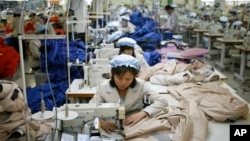South Korean businessmen say they have made no progress in talks with North Korea over wage increases at the jointly run Kaesong industrial complex.
Chung Ki-sup, the head of the council of South Korean businesses in Kaesong, said the two sides failed to bridge their differences during a two-hour meeting Wednesday.
"The North Korean authorities explained their stance that the current minimum monthly wage [for workers at the Kaesong complex] is not in line with the rise in consumer prices. They said that is the reason for getting rid of the limit on the five percent wage increase," he said.
It is not clear if the two sides will hold further meetings.
Pyongyang is trying to unilaterally raise wages for North Korean workers at the Kaesong Industrial Complex, which lies just north of the two countries' tense border. Seoul objects, saying such a move must be agreed to by both sides.
Last month, Pyongyang notified Seoul of its decision to raise the minimum monthly wage for its workers from $70.35 to $74.00 starting in March.
More than 53,000 North Korean workers are employed by about 120 South Korean factories in the park, which is one of the few areas of North-South economic cooperation.
Chung says he believes the current dispute is related to Pyongyang's anger over South Korean activists who frequently launch balloons filled with anti-North Korean propaganda over the border.
Seoul has tried to pressure the activists into stopping the balloon launches, but says it has no power to force them to do so.
There are concerns the Kaesong factories could be temporarily shut down if the dispute worsens. Pyongyang closed the complex for five months in 2013 during a time of heightened diplomatic tensions.
According to an inter-Korean agreement on the complex, wages for the North Korean workers should be determined through mutual agreement.
South Korea's government has pressured the companies not to give in to Pyongyang's demands. On Tuesday, Seoul's Unification Ministry said it had blocked Pyongyang’s prior attempts to meet directly with representatives of the South Korean companies.
“Our government will never accept any unilateral regulation changes by the North, and will work very closely with companies with operations in Kaesong to rectify the situation,” said Lim Byeong-cheol, spokesman for the South Korean Unification Ministry.
The South Korean companies have said they agree with the government’s position.
“I am not saying the rate hike is impossible. But since the business complex is created as a joint project, such a unilateral decision to revise the business guideline is unacceptable,” said Yoo Chang-keun, vice chairman of the South’s Kaesong Industrial Complex Business Association.
In a phone interview with the VOA Korean Service, Yoo warned that the South Korean companies will have no option but to leave the complex if the North continues to breach the guidelines.
Jee Abbey Lee contributed to this report, which was produced in collaboration with the VOA Korean service.




